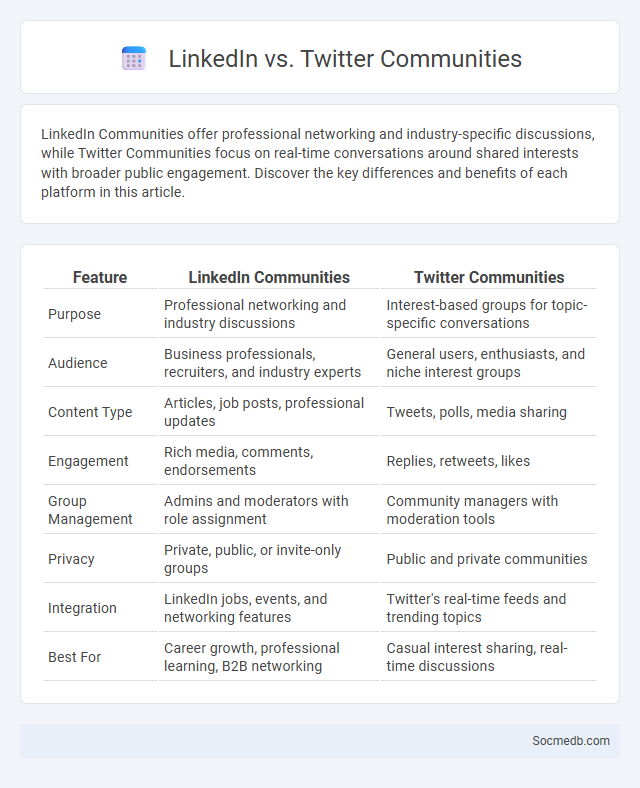
Photo illustration: LinkedIn vs Twitter Communities
LinkedIn Communities offer professional networking and industry-specific discussions, while Twitter Communities focus on real-time conversations around shared interests with broader public engagement. Discover the key differences and benefits of each platform in this article.
Table of Comparison
| Feature | LinkedIn Communities | Twitter Communities |
|---|---|---|
| Purpose | Professional networking and industry discussions | Interest-based groups for topic-specific conversations |
| Audience | Business professionals, recruiters, and industry experts | General users, enthusiasts, and niche interest groups |
| Content Type | Articles, job posts, professional updates | Tweets, polls, media sharing |
| Engagement | Rich media, comments, endorsements | Replies, retweets, likes |
| Group Management | Admins and moderators with role assignment | Community managers with moderation tools |
| Privacy | Private, public, or invite-only groups | Public and private communities |
| Integration | LinkedIn jobs, events, and networking features | Twitter's real-time feeds and trending topics |
| Best For | Career growth, professional learning, B2B networking | Casual interest sharing, real-time discussions |
Understanding the Platforms: LinkedIn, Twitter Communities, and Niche Communities
Understanding the platforms LinkedIn, Twitter Communities, and niche communities is essential for maximizing your social media strategy. LinkedIn excels in professional networking and B2B engagement, while Twitter Communities offer real-time discussions around specific interests, enhancing targeted content reach. Niche communities provide specialized, highly engaged audiences that drive meaningful connections and brand loyalty.
Audience Demographics and User Intent
Understanding audience demographics on social media allows your content to be tailored to specific age groups, locations, and interests, maximizing engagement and relevance. Identifying user intent--whether informational, transactional, or social--guides the creation of targeted campaigns that address the specific needs and motivations of your followers. By aligning demographic insights with user intent, you can boost conversion rates and foster stronger community connections.
Content Formats and Engagement Styles
Social media content formats such as videos, stories, reels, and live streams drive higher user engagement by catering to diverse audience preferences. Interactive engagement styles including polls, Q&A sessions, and comment-driven conversations enhance user participation and foster community building. Optimizing content for platform-specific algorithms increases visibility and maximizes reach across Facebook, Instagram, TikTok, and LinkedIn.
Networking and Relationship Building Opportunities
Social media platforms offer robust networking and relationship-building opportunities by connecting individuals and businesses across diverse industries and global regions. These platforms facilitate real-time communication, collaboration, and content sharing, enabling users to establish professional connections, engage with target audiences, and foster long-term partnerships. Leveraging LinkedIn, Twitter, and niche forums can significantly enhance visibility, credibility, and trust within specific communities.
Professional Branding and Thought Leadership
Building a strong professional brand on social media elevates visibility within industry networks and attracts targeted opportunities. Publishing consistent, insightful content establishes thought leadership, positioning individuals as experts and trusted voices in their fields. Engaging actively with relevant communities and sharing original perspectives fosters credibility and expands influence across platforms like LinkedIn and Twitter.
Community Moderation and Governance
Effective community moderation and governance on social media platforms ensure a safe, inclusive environment by enforcing clear guidelines and swiftly addressing harmful content. Implementing AI-driven moderation tools alongside human oversight helps maintain authentic interactions and prevents misinformation. Your active participation in reporting violations strengthens the platform's commitment to respectful and responsible communication.
Growth Potential and Discoverability
Social media platforms offer unparalleled growth potential by enabling brands to reach vast and diverse audiences through targeted algorithms and viral content sharing. Enhanced discoverability is driven by features like hashtags, trending topics, and personalized recommendations that increase visibility and engagement. Leveraging these mechanisms strategically can significantly amplify user acquisition and brand awareness.
Analytics, Insights, and Performance Tracking
Social media analytics provides detailed insights by collecting and analyzing data from platforms like Facebook, Instagram, and Twitter to optimize content strategy and audience engagement. Performance tracking tools measure key metrics such as reach, impressions, click-through rates, and conversion rates to help you identify trends and make informed decisions. Leveraging these analytics enhances your brand's online presence and drives higher ROI through targeted social campaigns.
Advantages and Drawbacks of Each Community
Facebook offers extensive networking opportunities and diverse community groups, enhancing user engagement across various interests. However, it faces challenges like misinformation spread and privacy concerns that can impact user trust. Instagram excels in visual storytelling and brand promotion but may contribute to unrealistic lifestyle comparisons and mental health issues.
Choosing the Right Platform for Your Goals
Selecting the appropriate social media platform hinges on clearly defined business objectives and target audience demographics. Platforms like Instagram excel in visual storytelling for lifestyle brands, while LinkedIn offers robust B2B networking opportunities ideal for professional services. Leveraging analytics to match platform features with specific marketing goals enhances engagement, conversion rates, and overall campaign effectiveness.
 socmedb.com
socmedb.com